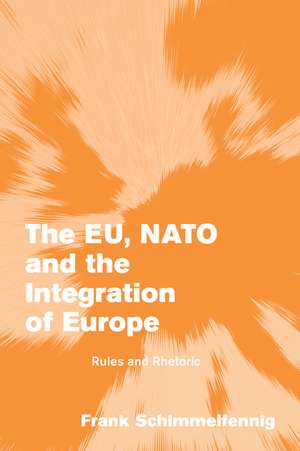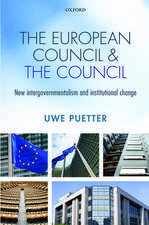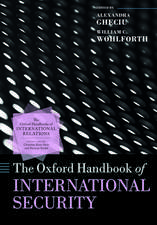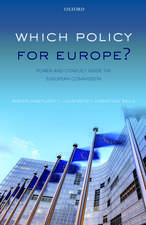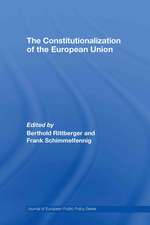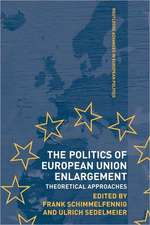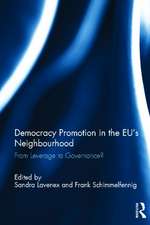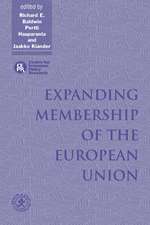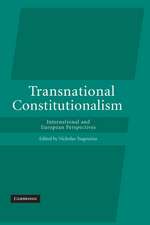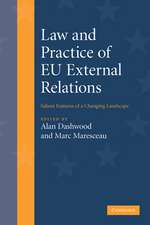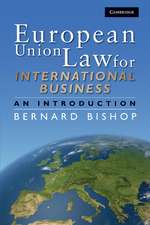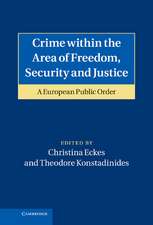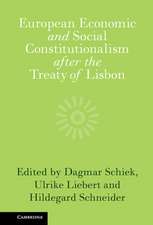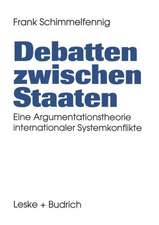The EU, NATO and the Integration of Europe: Rules and Rhetoric: Themes in European Governance
Autor Frank Schimmelfennigen Limba Engleză Paperback – 17 dec 2003
| Toate formatele și edițiile | Preț | Express |
|---|---|---|
| Paperback (1) | 291.91 lei 6-8 săpt. | |
| Cambridge University Press – 17 dec 2003 | 291.91 lei 6-8 săpt. | |
| Hardback (1) | 789.06 lei 6-8 săpt. | |
| Cambridge University Press – 17 dec 2003 | 789.06 lei 6-8 săpt. |
Din seria Themes in European Governance
-
 Preț: 287.87 lei
Preț: 287.87 lei -
 Preț: 287.48 lei
Preț: 287.48 lei -
 Preț: 288.62 lei
Preț: 288.62 lei -
 Preț: 328.06 lei
Preț: 328.06 lei -
 Preț: 287.07 lei
Preț: 287.07 lei -
 Preț: 290.76 lei
Preț: 290.76 lei -
 Preț: 287.66 lei
Preț: 287.66 lei -
 Preț: 285.93 lei
Preț: 285.93 lei -
 Preț: 288.42 lei
Preț: 288.42 lei -
 Preț: 290.76 lei
Preț: 290.76 lei -
 Preț: 283.25 lei
Preț: 283.25 lei -
 Preț: 288.04 lei
Preț: 288.04 lei - 14%
 Preț: 840.96 lei
Preț: 840.96 lei
Preț: 291.91 lei
Nou
55.87€ • 58.17$ • 47.21£
Carte tipărită la comandă
Livrare economică 10-24 martie
Specificații
ISBN-10: 0521535255
Pagini: 340
Ilustrații: 1 b/w illus. 32 tables
Dimensiuni: 152 x 229 x 19 mm
Greutate: 0.55 kg
Ediția:Text mare
Editura: Cambridge University Press
Colecția Cambridge University Press
Seria Themes in European Governance
Locul publicării:Cambridge, United Kingdom
Cuprins
List of figures; List of tables; Acknowledgements; List of abbreviations; Introduction; Part I. Security, Power or Welfare? Eastern Enlargement in a Rationalist Perspective: 1. Rationalist institutionalism and the enlargement of regional organizations; 2. NATO enlargement; 3. EU enlargement; Conclusion: the rationalist puzzle of Eastern enlargement; Part II. Expanding the Western Community of Liberal Values and Norms: Eastern Enlargement in a Sociological Perspective: 4. Sociological institutionalism and the enlargement of regional organizations; 5. Eastern enlargement and the Western international community; 6. The event history of enlargement; Conclusion: the sociological solution to the enlargement puzzle; Part III. Association Instead of Membership: Preferences and Bargaining Power in Eastern Enlargement: 7. Process hypotheses; 8. State preferences and the initial enlargement process; Conclusion: the double puzzle of Eastern enlargement; Part IV. From Association to Membership: Rhetorical Action in Eastern Enlargement: 9. Rhetorical action; 10. The decision to enlarge NATO; 11. The decision to enlarge the EU; Conclusion: solving the double puzzle of Eastern enlargement; Strategic action in international community: concluding remarks; Appendix (interviews); List of references; Index.
Recenzii
'… this study is a significant and valuable contribution to the rationalist-constructivist debate in IR'. International Affairs
'Frank Schimmelfennig has steadily been making a name for himself over the years as a thoughtful and creative contributor to International Relations theory and European Studies. This work will confirm his status as a scholar of originality and insight. … this book is a model of problem-driven but theoretically informed social science. It is thorough and systematic in its treatment of the subject matter; explicit in its theoretical assumptions; and incorporates new empirical data. … an important and timely book. … His book deserves to be widely read and discussed.' European Foreign Affairs Review
Descriere
Why did Western European states agree to the enlargement of the EU and NATO? Frank Schimmelfennig analyzes the history of the enlargement process and develops a theoretical approach of 'rhetorical action' to explain why it occurred. While rationalist theory explains the willingness of East European states to join the NATO and EU, it does not explain why member states decided to admit them. Using original data, Schimmelfennig shows that expansion to the East can be understood in terms of liberal democratic community building. Drawing on the works of Jon Elster and Erving Goffman, he demonstrates that the decision to expand was the result of rhetorical action. Candidates and their supporters used arguments based on collective identity, norms and values of the Western community to shame opponents into acquiescing to enlargement. This landmark book makes an enormous contribution to theory in international relations and to the study of European politics.
